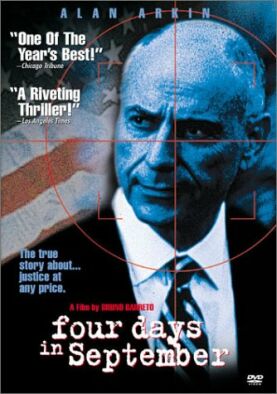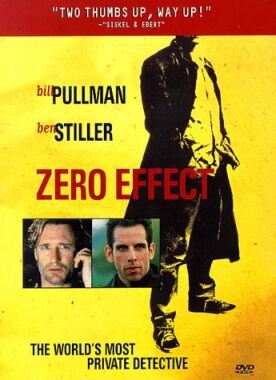Four Days in September (O Que É Isso, Companheiro?)
Four Days in September by the Brazilian director Bruno Barreto has about it the sepia tones of an old photograph. How strange people were in those far off days of 1969, and what strange things they did. Much credit is due to Barreto, himself a former leftist, for the skill and artistic restraint involved in trying to see things as they were and not through the prism of ideology. It is encouraging that that ideology—the crude, middle-class, Marcusian Marxism of the so-called “urban guerrillas” of the ’60s—now seems as dead as its close ideological stable-mates, Red Guard Maoism and Castroism, so that it is relatively easy to look at it with some objectivity. Of course we now have our own successor versions of Marxism to endanger the world in the 90s, versions which we can but hope will look in 30 years at least as sad and deluded as these do.
The film tells the true story of the kidnapping of the American ambassador in Rio de Janiero, Charles Burke Elbrick, in September, 1969. Barreto begins by introducing us to the kidnappers, who are perfectly nice middle-class kids infected with the ideological bug and eager to play at “revolution.” Their delusion is all the more dangerous for not seeming stupid or vicious but as plausible as these things get. They include Fernando (Pedro Cardoso) and Andrea (Fernanda Torres) who are given the noms de guerre of Paulo and Maria. All the other kidnappers are known to us only by their pseudonyms, and there is a wonderful scene, when Paulo and Maria think they are going to be captured and express a hitherto suppressed love for each other by violating all party discipline and revealing the real names.
Alan Arkin does a marvelous job in the role of Ambassador Elbrick. Of course he is given good liberal attitudes, claiming to oppose the Vietnam war and to believe (as he doubtless does) that the Brazilian dictatorship is a mistake, “a short term solution” to the problem of political stability that will bring about long term problems and make the people hate it. But this, even if it were not true of the historical Ambassador Elbrick, would be dramatically necessary so that the young revolutionaries would be forced to confront the disparity between their crude ideological categories and the real world they so unsuccessfully classify.
There are wonderfully touching and funny moments as the amateurish but still very dangerous kidnappers almost give themselves away by forgetting to lay in a supply of food. Paulo has to go out for pizza and other take-out food in such quantities that he excites suspicion and soon leads the police to their doorstep. One of these expeditions also provides another example of the incongruousness of Brazilian political realities as a taxi driver, unaware of who he is driving, his arms filled with pizzas, starts talking about how much he admires the bravery of the kidnappers he has been hearing about in the news. “Those guys are my heroes,” he says—“them and the astronauts.”
Even the policemen and torturers working for the Brazilian dictatorship are presented with some sympathy and a strong element of “banality of evil” thinking. One of them says to his girlfriend of the young revolutionaries that “Most of them are innocent kids with big dreams”—an opinion shared by the hardened Communist veteran who takes charge of their operation and ultimately by the kids themselves when, after the kidnapping is over, Paulo speaks to Maria of “a dream that failed,” and laments that “we were shouting into the wind.” But torture helps to confirm them both in their sublime ignorance of the fact that, as the torturer says, those on whose behalf they gave their youth were “scum” whose regime, if it ever came would be far worse than that of the dictators. Barreto may not have intended to give his summing up to the torturer, but it is one measure of his film’s success that it can be read in this way.
Discover more from James Bowman
Subscribe to get the latest posts to your email.








